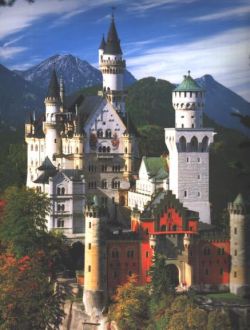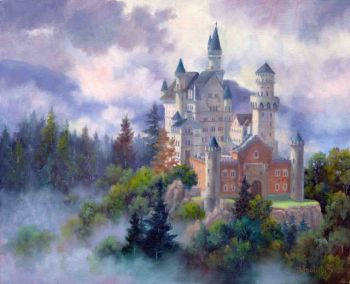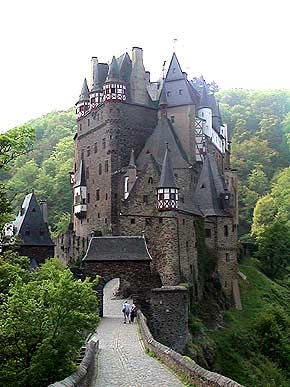This is the German branch of KENAX translation agency and part of a global
consortium of language affiliates. For translation services in the German
language, please contact us at [email protected],
or if you would like to avoid fighting past our spam guard, send us a message through our
central contact
form.
Applying translators please fill in our translator application form.
Below you will find some of the language combinations we specialise in, but we are able to
handle much more than this with the cooperation of our affiliate branches abroad.
History of the German Language
 |
German is a member of the western branch of
the Germanic family of languages, which in turn is part of the Indo-European language
family.
There are 90 -120 million native German speakers around the world and, according to
Guinness book of world records, most translations performed in the world are into and from
German. 32% of the EU-15 countries say they can converse in it.
The language is closely related to English and Dutch, as is explained in the History of English section.
20 million people around the world speak it as their non-native language, creating such
interesting varieties as Pennsylvania Dutch (a west central German variety), Texas German,
and Aleman Coloniero in Venezuela [alemagne of French, all countries?] , depending on the
dialect spoken of the Germans who first moved there or colonised the area. [ Yiddish..
German is the third most taught foreign language in the world and apparently 7.7% of
webpages are written in the German language (second to English), with 12% of google
surfers using its German interface.
The recorded history of the language begins between the 6th and 8th century when a major
consonant shift took place, while various dialects seemed to form across the many states
and regions of the German lands. Writers had a habit of merging the various dialects in
hopes that their works would be readable across the greatest population possible, and this
approach was applied by Martin Luther when he translated the bible in 1522, although his
translation had many subnotes translating various terms into local dialects. |
The Catholic church put out its own version, while the protestant and Catholic
renditions, although not that much different, battled it out until an acceptable standard
was agreed upon in the middle of the 18th century.
Up to the middle of the 19th century, the language became the medium of commerce of the
Habsburg empire, covering a large area of Central and Eastern Europe. Local languages
remained, but German was the language of merchants from as far as Milan, Zagreb and
Bratislava.
This standard or high German which was developed to encompass a broader region was often
learned and considered as a foreign language by the various dialects, and frequently was
not even uttered until early school, although television and the media are now reaching to
preschool levels. The first dictionary of the Brothers Grimm [ , written in 1860, remains
the most comprehensive guide to this created language.
The language underwent a spelling reform in 1996, but which led to much controversy,
primarily over the issue whether a language should represent its regional cultures or
whether it should be a means to facilitate communication. The battle went as far as the
Supreme Court, until the federal government intervened to officially adopt a new standard
just in time for the 2006 school year.
[ Yiddish..
The German language is composed of three main dialects [show pic?].
Not only does the German speaking area encompass a large region of many varied dialects,
whose speakers frequently do not even understand each other, and not only does the adopted
standard or high German also differ across regions, the way surrounding countries call
Germans is also quite varied. For example, the Slavic countries apply some rendition of
the word mute ("nemoj" in Russian), signifying that the Germans were the first
peoples the Slavs came across who they could not communicate with. [In Italian the sole
name for German is still tedesco, from the Latin theodiscum, meaning
"vernacular".]
History of Germany
Records start around the 6th century, when the Merovingian kings of themselves dynasts
of the Germanic Franks, conquered several other German tribes and placed them under
control of autonomous dukes of mixed Frankish and native blood.
Roman provinces north of the Alps had been Christianised since the fourth
century, with missionary work revived in the 6th century by Irish-Scottish monks.
Located in the heart of Europe, the German lands underwent the usual European bloody
history of power struggle.
In the early 16th century, there was much discontent in Germany due to the abuses of the
Catholic church, with Martin Luther nailing his call for reformation onto the church door
in 1517. In 1545 the counter reformation began by the Spanish Jesuit order, dividing
Germany into central and north-east protestant areas, and western and southern Catholic
areas. In 1618 the Protestant nobility in Prague exercised its interesting invention of
defenestration, which is a form of execution by simply pushing someone out the window of a
high tower. However, the fact that this time it was the emperor of Europe sparked a major
war, the main theatre of which took place in Germany, wiping out one third of its
population and laying the country to waste. After this Thirty Years' War, the country was
divided up among the waging powers, and Germany grew weaker as the controlling powers each
exercised their rights.
|
 |
Over time Prussia grew into a great European power, as did Austria, under the
Habsburgs, and thus started their rivalry for control over Germany. And as is akin to
European history, various wars moved boundaries, with parts of West Germany going to
France under Napoleon, parts of Poland going to Prussia with the Partition of Poland, and
then both moving back in the original power's favour.
After the fall of Napolean in 1815, European nations gathered in Vienna to redraw the
continental map and set new rules. The Holy Roman Empire had already dissolved in 1806,
and at the Congress of Vienna, the Holy Empire of the German Nation had been transformed
into a loose federation 39 states, called the German Federation. Nationalist sentiments
were kindled, eventually leading to the Austro-Prussian war of 1866, favouring Prussia,
which came into control of a new North German Federation, Austria remaining outside German
affairs through the 19th and 20th centuries.
National sentiment grew stronger, eventually leading to a dissolution of the German
Confederation and the creation of the German Empire in 1871, led by Otto Von Bismark. A
dispute with France led to a war which brought German troops as far as Paris, French
emperor Napolean III was taken prisoner and the Second French Empire collapsed. Much land
previously lost to France was regained, and then some to add even French speaking areas.
Bismark wanted to consolidate power and focus on a "little Germany", but powers
within were ambitious to colonial acquisitions abroad. There was a policy of Germanisation
where Polish, Danish and French minorities were discriminated against, and Bismark had a
hard time repressing the growing influence and ultra nationalistic and inflamatory
tendencies of the Social Democratic Party of Germany. Bismark formed an alliance with
Austria (the Dual Alliance), and eventually Italy, to form the Triple Alliance as a
deterrence against France's possible ambitions to team up with Russia in order to regain
lost soil.
But Bismark eventually ceded to expansionist pressure, led by Wilhelm II, and many German
colonies in Africa and Asia were formed. Wilhelm's expansions abroad led to various
frictions, which Bismark wanted to avoid, and from 1898 Germany started constructing
warships to protect its various overseas possessions, directly threatening Britain and
isolating itself further.
General imperialist ambitions between the various European powers, the armaments race,
generally differing policies between the European states, German-British rivalry,
difficulties of the Austro-Hungarian multinational empire and Russia's Balkan policy
contributed to a tinder box which exploded when the Austrian heir apparent Franz Ferdinand
was shot in 1914 with his wife by a Serbian nationalist while they were visiting Sarajevo.
Overhasty mobilisations and ultimatums, the concerned powers believing that a conflict
would be short, led to Germany taking the side of Austria-Hungary, Bulgaria and the
Ottoman Empire against Russia, France, Great Britain, Italy, Japan and others to initiate
the First World War, the fighting spreading to the Near East and around Germany's colonies
abroad.
The war was one of attrition, with borders barely moving. Germany's policy of unrestricted
submarine warfare provoked the Americans and marked a decisive turning point against
Germany, and Britain's blockade in the North Sea with its crippling effects on Germany's
supply of raw materials and foodstuffs brought Germany to its knees and led to the Treaty
of Versailles in 1919. Germany and her allies were to accept full responsibility for the
war and all its damages, parts of Poland were restored free of German rule, administration
of the country's important industrial Rhine region was handed to the League of Nations for
the next 15 years, the coal fields were to be administered by France, Germany's standing
army was reduced to 100,000, and the production of all military arsenal was severely
curtailed.
In the face of such humiliation, bitter indignation was provoked throughout Germany and
its fragile democracy was seriously weakened. Extremist left and right wing parties
flourished, and with so many troops leaving the military to attain the newly imposed
100,000 limit, the abundance of disgruntled army personnel was exploited by the right wing
powers. With the US pulled out of Europe, Germany was the first state to establish
diplomatic relations with the Soviet Union, and the two powers agreed to cancel all
pre-war debts. In 1923 Germany refused to pay war reparations, inciting French and Belgian
troops to occupy the heavily industrial Ruhr district. The German government encouraged
passive resistance and the local population cooperated by not providing any services to
the invading forces. This proved effective but led to hyperinflation. Many lost their
fortune, blamed the democratic government, and eventually were to support the
anti-democratic right.
The passive resistance proved too costly, eventually dismantled, a new currency
introduced, and hyperinflation was brought under control. Economic stability resumed and
over the next 6 years Germany's industrial production returned to pre-war levels. Adolf
Hitler, born in Austria and a former volunteer of the German army in WWI, tried a coup
d'etats with his storm troopers, but was arrested and put in jail on a five year sentence,
serving less than a year of that.
Subsequent national elections gave power to the extreme left and right wing parties, and
the stock market crash in 1929 on Wall Street initiated the Great Depression and led to
economic deterioration in Germany, with 6 million unemployed. This created more fertile
ground for the right, and with the right wing party winning 38% of the vote in 1932,
pressure from the former Chancellor and other conservatives forced President Hindenburg to
accept Hitler as Chancellor.
Hitler was ambitious for more power, called general elections in the hopes of winning a
majority for his party, and even took quick advantage of a fire set in the Reichstag
building by painting an alleged Communist uprising on the wall. With this and the
beginnings of his propaganda machine, he convinced President Hindenburg to repeal the
liberal constitution and remove important political and human rights.
Eleven thousand Communists and Socialists were placed in concentration camps under the
rule of the Gestapo, the newly established secret police force, and nine thousand of the
abductees were found guilty, many of them executed.
But despite the terror and extensive propaganda, Hitler still failed to win a majority for
his party. However, by various manoeuvres, such as the arresting or killing of opposition
deputies and defining their absense from key votes as voluntary, and by forming a
coalition with the German National People's Party, Hitler managed to negotiate dictatorial
powers for himself, which he used to gain further power, even weeding out by execution
without a trial opposition forces within his own Nazi SA. The SS became an independent
organisation in command of the Gestapo, the rights of Jews were severely repressed, and
Hitler began a military expansion - in fragrant breach of the Treaty of Versailles but
faced with little more than written protest by Britain, France and Italy.
The people of Germany were generally happy with his strong show of force, and the 1936
Summer Olympic in Berlin proved another opportunity for Hitler's propaganda machine,
winning him greater popularity.
Hitler now felt stronger and began a more aggressive foreign policy, signing an
Anit-Cominterm Pact (against communists [ ) with Italy and Japan, and moving into Austria
to force an annexation, which was applauded by 99% of Austrians. And hence the dream of a
greater Germany first shunned by Bismark in favour of his "little Germany" had
been realised, and the age old aspirations of a German Reich had come to fruition, this
illegal annexation once again only merely protested by the western powers.
After Austria Hitler turned to the Sudeten portion of Czechoslovakia and where the 3.5
million strong German minority was demanding equal rights and self government. This move
was ratified at the Munich Conference by the leaders of France, Britain and Italy, and
Hitler declared that all of Germany's territorial claims had been fulfilled.
But the lust for greater power can never be quenched by such a dictator, and Hitler used a
quarrel between the Czechs and Slovaks as pretext to take over the entire country and
become the Protectorate of Bohemia and Moravia. He secured the return of some land from
Lithuania, and the British Prime Minister was forced to acknowledge that his policy of
appeasement with the Germans was a mistake.
The next six years were spent preparing for World War II. Hitler wanted to strengthen
nationalist allegiance and subsequently promoted throughout his entire domain the identity
of a superior Aryan race by subjugating and repressing Jews, Gypseys, Poles, Russians, and
even the mentally and physically handicapped. In Alliance with the Soviet Union, he then
invaded Poland in 1939.
But the forces against evil conquered, after 60 million mostly civilian deaths throughout
all of Europe (including 6 million Jews and 5 million non-Jews in the Holocaust), with
Germany ending in economic devastation and suffering much territorial losses, and the
partition. This devastation and near total collapse referred to by Germans as the zero
hour.
Once again the western powers, and this time also Russia, imposed restrictions on Germany,
carving it up amongst themselves into four military occupied zones, abolishing the entity
of Prussia, and forced the repatriation of many Germans abroad, leading to a mass exodus
from East Europe during which millions died of exhaustion and dehydration.
 |
Once again, the western powers aimed to hamper
Gemany's industrial potential, to avoid future possible conflict, but the US soon decided
that economic prosperity in Europe, a major trading partner for the US and hence
imperative for its own economic might, was dependent on a strong Germany, itself
traditionally dependent on a robust industrial base. The strategy of the US forces in
Germany was now changed to promote peaceful prosperity, and economic reforms together with
the Mashall Plan to help reconstruct Europe led to a long period of recovery for West
Germany, which joined NATO in 1955, was a founding member of the European Economic
Community (EEC) in 1958, and soon became the richest and most advanced country of the
Warsaw Pact.
Longings for a unified Germany persisted, a policy of two German states in one German
nation was adopted, and in 1973 East Germany and West Germany were admitted to the United
Nations.
With the aggressive armament race policy of the US aimed at bankrupting the Soviet Union,
and continued civil unrest in Poland making control of Eastern Europe increasingly costly
and unprofitable for the Soviets, the ruling communists decided on moving towards a free
enterprise system. Much of the communist elite, strategically placed in politics and the
bureaucratic maze of starting a business, became the rich capitalists, and the communists
chose to free themselves of the burden of Eastern Europe and give up on the arms race
against the Americans. The two Germany's reunited a year later, and the new Germany has
taken a leading role in the European Union, applying the historical record of a stable
German mark to take the forefront of exploiting the momentum of monetary union to advance
the creation of a more unified and capable European political, defence and security
apparatus. Lately it has expressed interest in a permanent seat for Germany on the UN
Security Council, citing France's, Russia's and Japan's support to strengthen its bid.
|
With decades under the influence of western powers, a culture of intolerance to war has
been nurtured and educated into the German population, the country joining France and
others to oppose the US invasion of Iraq.
With Germany's historically strong industrial base, it is natural that it would win many
EU tenders for the manufacture of Europe's military arsenal. Following the US invasion of
Iraq and in spite of the foreseeable objection of the Bush administration, the EU has
begun the creation of its own rapid deployment force, outside the control of Nato. The
Germans joke at the extreme right wing party in power in Austria, and at an Austrian born
representative now as Republican governor of California, whereby conservative powers in
the US seek to change legislation and enable Schwartzeneggar [ to run for presidential
office. With the rise of China, it will be interesting to see the turn of events in this
increasingly dynamic world and what this great and strong nation will achieve in it.
Like this content? Please support it by pressing any or all of these links below:
Copyright © KENAX, by Karel Kosman - All Rights Reserved Worldwide.
Some of the German Language Combinations We Specialise In
Other Language Combinations Page |





